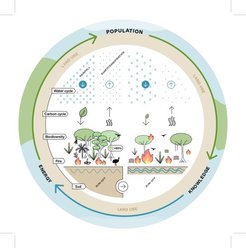Looking to Tropical Forests to Find the Roots of the Anthropocene
Even early human interaction with the tropical forests had irreversible consequences that will continue to have an impact beyond the 21st century.

Human activity has brought a new age to our planet, and the Anthropocene Working Group is moving closer to having the Anthropocene epoch formally recognized as beginning in the mid-20th century. Human societies have even formed a new Earth System, the technosphere, which includes all human-made things, land use, and energy flows and weighs more than 30 trillion tons. We are bearing down on our planet and heading towards certain tipping points, such as the loss of the Amazon rainforest, that will irreversibly alter the state of the Earth (Wünderling et al., 2016).
Although the rate of human impacts has accelerated in recent centuries, the social, economic, technological and environmental roots of the Anthropocene lie much further in the past. From the origins of farming to European arrival in the Americas and the onset of the ‘Columbian Exchange’, past human societies have left important ‘Earth System heritages’ for the contemporary world (Lewis and Maslin, 2015).
A focus on the tropics
Tropical forests are critical to the functioning of the Earth system. Yet, they have often been neglected in discussions of human history, considered ‘wild’ or pristine prior to the industrial period. In a paper published in Nature Ecology & Evolution, the departments of the Max Planck Institute of Geoanthropology combined to explore the legacies of past human impacts on tropical forests, demonstrating the importance of interdisciplinary research for understanding human history in the tropics and navigating the social and economic challenges in the 21st century Anthropocene.
New archaeological, historical and palaeoecological research is highlighting the ways in which past human land use – from burning landcover to building cities – has impacted plants, animals, soils, and the climate. These impacts are particularly important in tropical forests, where changes can have regional and global consequences (Malhi et al., 2014). Given the ecological importance of the tropics, as well as forecasted increases in population and urban growth, it is increasingly important to explore how technologies, socioeconomic systems, land use, and the Earth system have interacted in these regions through time.
Tropical land use thresholds
Existing research into past human impacts on the planet have relied on generalized calculations or assumptions. At the Max Planck Institute of Geoanthropology, we have developed a framework to combine diverse datasets to produce quantitative ‘maps’ of land use for different regions and time periods. From ancient plant and animal remains to historical texts, from sediment records in lakes to remote sensing in the air, these data can be used to model how past human action may have influenced biodiversity, soils, and climate, and what consequences this left for subsequent environments and societies.
In our new study, we identify three major thresholds in human tropical land use that may have had consequences for the Earth system. The first two focus on the emergence of food production and urbanism. Many foods we take for granted (e.g. chicken, maize, chocolate) come from the tropics, while the spread of crops such as rice and water buffalo through tropical forests has been linked to increases in deforestation, soil erosion and emissions (Roberts, 2021). Meanwhile, the appearance of urbanism on all of the tropical continents between 2,000 and 1,000 years ago may have introduced new pressures on forest cover, while also supporting the flow of new species, information, and technology. Data from the past, however, also highlight the ways in which tropical approaches to food production and urbanism maintained mosaics of forests, fields, agroforestry, and settlement, very different to Euro-American ideas of agriculture and cities (Roberts, 2021).
The third threshold is the arrival of European and, later, US colonialism in the tropics. The arrival of Iberian empires in the Americas in the 15th century CE brought together long-separated continents, resulting in the widespread exchange of wild and domesticated species, changing landscapes in many parts of the world forever. The spread of disease, alongside murder and enslavement practiced by colonial agents, dramatically impacted Indigenous populations and land use and, as a result, potentially Earth system feedbacks. Marginalization of Indigenous land management and the imposition of an extractive colonial system based on land clearance, profit, and enslaved and exploited labour continued as part of an expanding capitalist system between the 16th and 20th centuries (Moore, 2009), shaping current global inequalities and sustainability challenges.
From past to future
With our novel integration of archaeological and historical data in land use models, we can better understand how past human activity in the tropics may have influenced the Earth system. We can develop an understanding of how technologies and socioeconomic trajectories have interacted with soil quality, climate, and biodiversity across space and time, both regionally and globally. Here, the unique depth of the archaeological and historical record becomes a critical resource for contemporary planners and policy-makers, and scientists seeking to understand the present and future of the Earth system.
Our models also enable us to look for the origins of socioeconomic inequalities, expressed through land use, that shape lives in the Anthropocene. European colonialism, for example, has left its mark on the global economic and climatic forces operating on the tropics and its communities. By giving tangible and visual form to human impacts on the tropics, we can reveal the long-term impacts of western European and northern North American consumption. We can also highlight the need to support Indigenous and local populations battling climate change and negotiating conflicts between resource needs, ecosystems services and market pressures.












